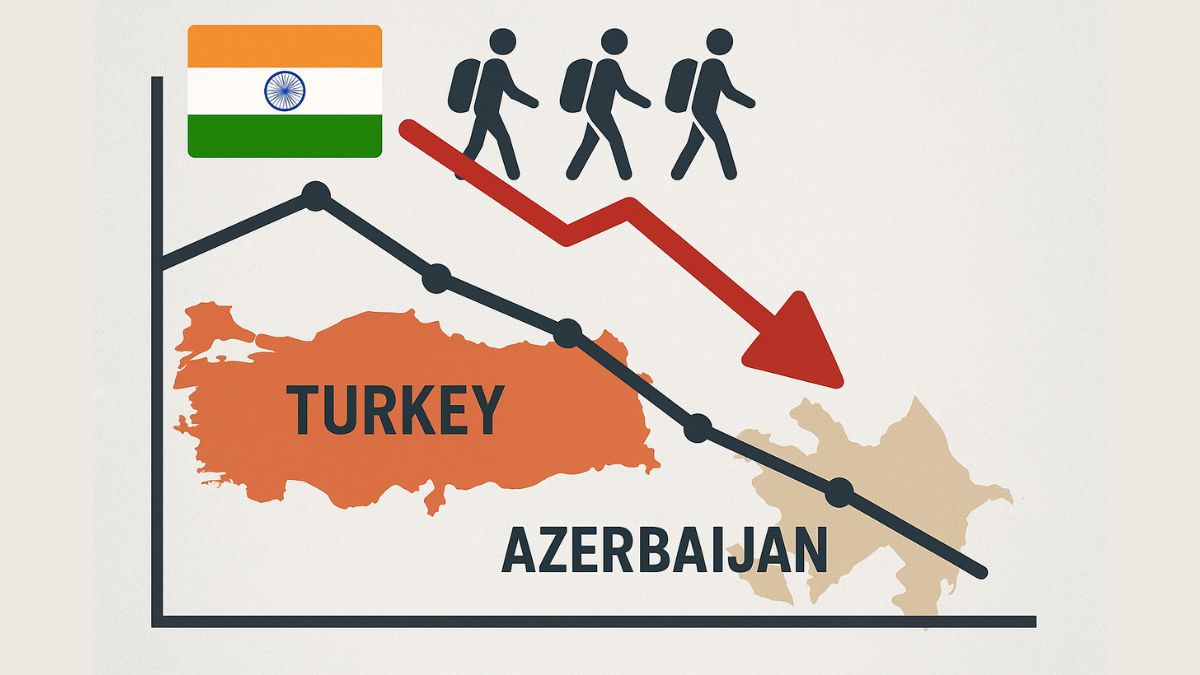When Nations Cross The Line: Not Missiles, But Passports! How India’s Silent Power Hit Turkey, Azerbaijan Hard

From June to August 2025, there was a sharp drop in Indians visiting Turkey and Azerbaijan. Image courtesy: AI-generated picture via Sora
It is not easy for someone to cross the line with India and then expect things to go all well and smooth. Whether it is any individual or any country, the consequences are harsh and unacceptable to them. Something similar has now happened with Turkey and Azerbaijan, countries widely popular among tourists.
When Pakistan-backed terrorists massacred over two dozen Indian civilians, mostly tourists, in Pahalgam April 22, 2025, India’s response under Operation Sindoor was swift and decisive. The Indian Air Force struck deep into Pakistan and Pakistan-occupied Kashmir, destroying terror hideouts and eliminating militant leaders.
The conflict intensified when the Pakistan Army jumped in, using drones to target Indian civilians. But India held its ground, repelled attacks, and forced Pakistan into a ceasefire after inflicting heavy blows on its military infrastructure. It should have ended there, but two other nations chose to stand on the wrong side of history – Turkey and Azerbaijan.
How Turkey and Azerbaijan miscalculated India’s resolve?
During the conflict, Turkey supplied drones to Pakistan which were used to target Indian military sites and cities. Azerbaijan, on the other hand, openly condemned India’s air raids against terror camps. Both countries not only aligned with Pakistan’s narrative but doubled down diplomatically.
Pakistan Prime Minister Shehbaz Sharif and Army Chief Asim Munir even visited Ankara and Baku to express gratitude for their support. They backed Islamabad when it targeted Indian civilians. Now, the consequences are arriving, not through missiles, but passports.
What is India’s ‘Soft Sanction’ and why is it hurting Turkey, Azerbaijan?
No official advisory. No government directive. No press statement. Instead, Indian travellers acted on their own when it came to standing up for their own people, their own country. From June to August this year, tourism data shows a sharp, measurable drop in Indians visiting both Turkey and Azerbaijan.
Azerbaijan’s fall from favour
There has been a marked 70% drop in number of tourists compared to last year. Between the June-August 2025 period, just 20,631 Indian visitors flew to the country, down from 69,576 in the same duration in 2024. On month-by-month basis, only 9,934 people visited Turkey in June 2025, down from 28,315 in June 2024.
In July, only 4,665 people went to Turkey versus 20,124 in the same month last year. August 2025 saw 6,032 Indians visiting the country, a big drop from 21,137 tourists in August 2024. That’s over 49,000 fewer travellers in just three months.
How was Turkey’s tourism hit?
It witnessed a 38% decline compared to 2024 numbers. Visitors fell from 93,963 to 58,544. The month-by-month slide was as following:
June: 24,250 (vs 38,307)
July: 16,825 (vs 28,875)
August: 17,649 (vs 26,781)
For both economies, this is not a symbolic dip, but a financial blow.
Is this economic pressure by design or sentiment?
There was no official boycott. But the public mood in India shifted visibly after Operation Sindoor. Travel platforms saw altered preferences, family planners chose alternatives, and influencers quietly reshaped itineraries. Indians, one of the world’s highest-spending travel communities, sent a message without a slogan – Support our enemies, and you won’t be our destinations.
India didn’t raise tariffs. It didn’t snap ties. It didn’t threaten embargoes. It simply withdrew presence, silently, strategically, and effectively. The result? Diplomacy felt in tourism numbers, public sentiment shaping foreign policy outcomes, a reminder that standing against India comes at a cost.







